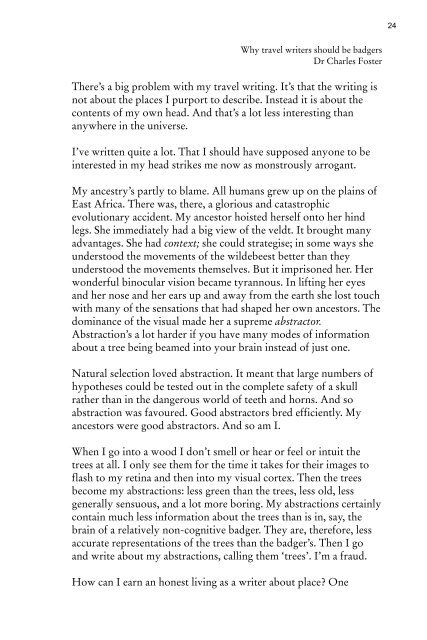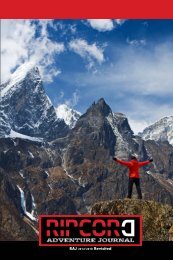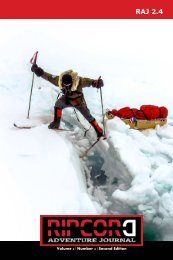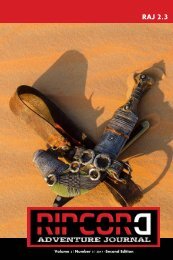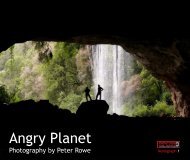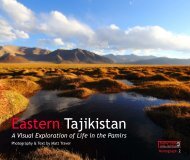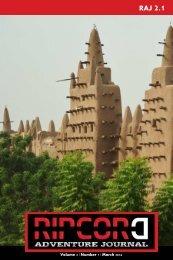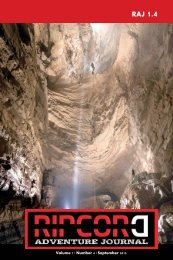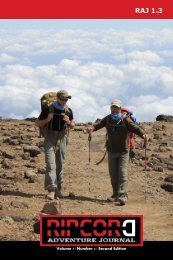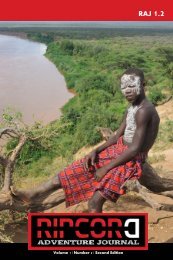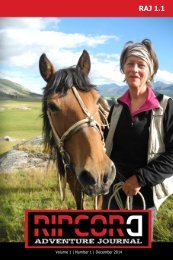Ripcord Adventure Journal 2.2
Our sixth issue of Ripcord Adventure Journal is a very different beast to its five earlier siblings, whose articles and images were, in the main, submitted by adventurous travel writers and photographers; in this issue however, we have brought together 11 accomplished explorers and adventurers who write about their unique experience of life, lived to the maximum and danced to a different beat.
Our sixth issue of Ripcord Adventure Journal is a very different beast to its five earlier siblings, whose articles and images were, in the main, submitted by adventurous travel writers and photographers; in this issue however, we have brought together 11 accomplished explorers and adventurers who write about their unique experience of life, lived to the maximum and danced to a different beat.
Create successful ePaper yourself
Turn your PDF publications into a flip-book with our unique Google optimized e-Paper software.
24<br />
Why travel writers should be badgers<br />
Dr Charles Foster<br />
There’s a big problem with my travel writing. It’s that the writing is<br />
not about the places I purport to describe. Instead it is about the<br />
contents of my own head. And that’s a lot less interesting than<br />
anywhere in the universe.<br />
I’ve written quite a lot. That I should have supposed anyone to be<br />
interested in my head strikes me now as monstrously arrogant.<br />
My ancestry’s partly to blame. All humans grew up on the plains of<br />
East Africa. There was, there, a glorious and catastrophic<br />
evolutionary accident. My ancestor hoisted herself onto her hind<br />
legs. She immediately had a big view of the veldt. It brought many<br />
advantages. She had context; she could strategise; in some ways she<br />
understood the movements of the wildebeest better than they<br />
understood the movements themselves. But it imprisoned her. Her<br />
wonderful binocular vision became tyrannous. In lifting her eyes<br />
and her nose and her ears up and away from the earth she lost touch<br />
with many of the sensations that had shaped her own ancestors. The<br />
dominance of the visual made her a supreme abstractor.<br />
Abstraction’s a lot harder if you have many modes of information<br />
about a tree being beamed into your brain instead of just one.<br />
Natural selection loved abstraction. It meant that large numbers of<br />
hypotheses could be tested out in the complete safety of a skull<br />
rather than in the dangerous world of teeth and horns. And so<br />
abstraction was favoured. Good abstractors bred efficiently. My<br />
ancestors were good abstractors. And so am I.<br />
When I go into a wood I don’t smell or hear or feel or intuit the<br />
trees at all. I only see them for the time it takes for their images to<br />
flash to my retina and then into my visual cortex. Then the trees<br />
become my abstractions: less green than the trees, less old, less<br />
generally sensuous, and a lot more boring. My abstractions certainly<br />
contain much less information about the trees than is in, say, the<br />
brain of a relatively non-cognitive badger. They are, therefore, less<br />
accurate representations of the trees than the badger’s. Then I go<br />
and write about my abstractions, calling them ‘trees’. I’m a fraud.<br />
How can I earn an honest living as a writer about place? One


